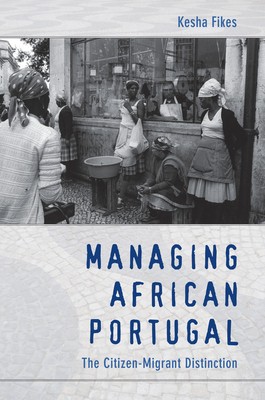
- We will send in 10–14 business days.
- Author: Kesha Fikes
- Publisher: Duke University Press
- ISBN-10: 0822345129
- ISBN-13: 9780822345121
- Format: 15.5 x 23.1 x 1.5 cm, softcover
- Language: English
- SAVE -10% with code: EXTRA
Reviews
Description
In Managing African Portugal, Kesha Fikes shows how the final integration of Portugal's economic institutions into the European Union (EU) in the late 1990s changed everyday encounters between African migrants and Portuguese citizens. This economic transition is examined through transformations in ideologies of difference enacted in workspaces in Lisbon between the mid-1990s and the early 2000s. Fikes evaluates shifts in racial discourse and considers how both antiracism and racism instantiate proof of Portugal's European "conversion" and modernization.
The ethnographic focus is a former undocumented fish market that at one time employed both Portuguese and Cape Verdean women. Both groups eventually sought work in low-wage professions as maids, nannies, and restaurant-kitchen help. The visibility of poor Portuguese women as domestics was thought to undermine the appearance of Portuguese modernity; by contrast, the association of poor African women with domestic work confirmed it. Fikes argues that we can better understand how Portugal interpreted its economic absorption into the EU by attending to the different directions in which working-poor Portuguese and Cape Verdean women were routed in the mid-1990s and by observing the character of the new work relationships that developed among them. In Managing African Portugal, Fikes pushes for a study of migrant phenomena that considers not only how the enactment of citizenship by the citizen manages the migrant, but also how citizens are simultaneously governed through their uptake and assumption of new EU citizen roles.
EXTRA 10 % discount with code: EXTRA
The promotion ends in 11d.12:07:23
The discount code is valid when purchasing from 10 €. Discounts do not stack.
- Author: Kesha Fikes
- Publisher: Duke University Press
- ISBN-10: 0822345129
- ISBN-13: 9780822345121
- Format: 15.5 x 23.1 x 1.5 cm, softcover
- Language: English English
In Managing African Portugal, Kesha Fikes shows how the final integration of Portugal's economic institutions into the European Union (EU) in the late 1990s changed everyday encounters between African migrants and Portuguese citizens. This economic transition is examined through transformations in ideologies of difference enacted in workspaces in Lisbon between the mid-1990s and the early 2000s. Fikes evaluates shifts in racial discourse and considers how both antiracism and racism instantiate proof of Portugal's European "conversion" and modernization.
The ethnographic focus is a former undocumented fish market that at one time employed both Portuguese and Cape Verdean women. Both groups eventually sought work in low-wage professions as maids, nannies, and restaurant-kitchen help. The visibility of poor Portuguese women as domestics was thought to undermine the appearance of Portuguese modernity; by contrast, the association of poor African women with domestic work confirmed it. Fikes argues that we can better understand how Portugal interpreted its economic absorption into the EU by attending to the different directions in which working-poor Portuguese and Cape Verdean women were routed in the mid-1990s and by observing the character of the new work relationships that developed among them. In Managing African Portugal, Fikes pushes for a study of migrant phenomena that considers not only how the enactment of citizenship by the citizen manages the migrant, but also how citizens are simultaneously governed through their uptake and assumption of new EU citizen roles.


Reviews